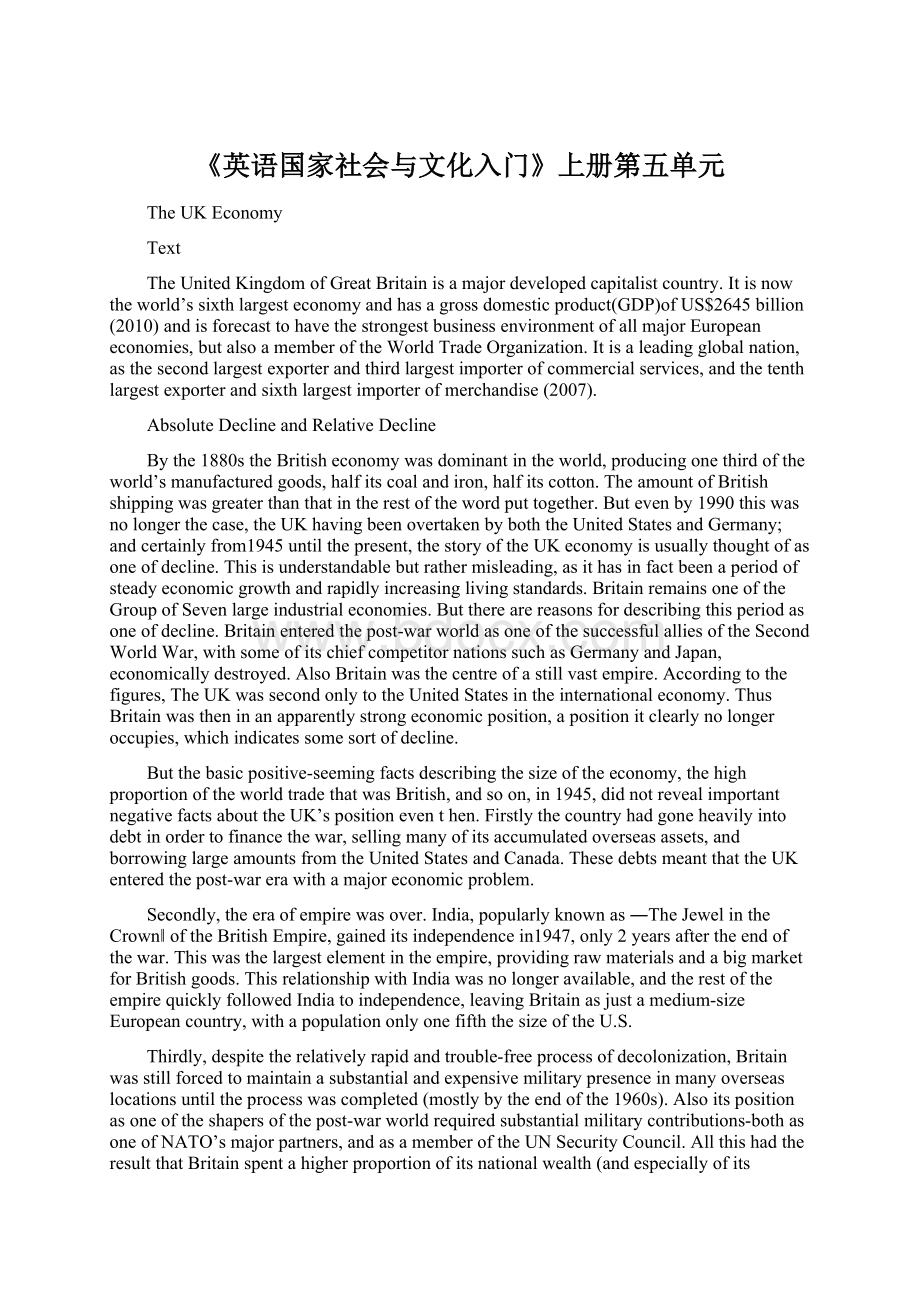《英语国家社会与文化入门》上册第五单元.docx
《《英语国家社会与文化入门》上册第五单元.docx》由会员分享,可在线阅读,更多相关《《英语国家社会与文化入门》上册第五单元.docx(5页珍藏版)》请在冰豆网上搜索。

《英语国家社会与文化入门》上册第五单元
TheUKEconomy
Text
TheUnitedKingdomofGreatBritainisamajordevelopedcapitalistcountry.Itisnowtheworld’ssixthlargesteconomyandhasagrossdomesticproduct(GDP)ofUS$2645billion(2010)andisforecasttohavethestrongestbusinessenvironmentofallmajorEuropeaneconomies,butalsoamemberoftheWorldTradeOrganization.Itisaleadingglobalnation,asthesecondlargestexporterandthirdlargestimporterofcommercialservices,andthetenthlargestexporterandsixthlargestimporterofmerchandise(2007).
AbsoluteDeclineandRelativeDecline
Bythe1880stheBritisheconomywasdominantintheworld,producingonethirdoftheworld’smanufacturedgoods,halfitscoalandiron,halfitscotton.TheamountofBritishshippingwasgreaterthanthatintherestofthewordputtogether.Butevenby1990thiswasnolongerthecase,theUKhavingbeenovertakenbyboththeUnitedStatesandGermany;andcertainlyfrom1945untilthepresent,thestoryoftheUKeconomyisusuallythoughtofasoneofdecline.Thisisunderstandablebutrathermisleading,asithasinfactbeenaperiodofsteadyeconomicgrowthandrapidlyincreasinglivingstandards.BritainremainsoneoftheGroupofSevenlargeindustrialeconomies.Buttherearereasonsfordescribingthisperiodasoneofdecline.Britainenteredthepost-warworldasoneofthesuccessfulalliesoftheSecondWorldWar,withsomeofitschiefcompetitornationssuchasGermanyandJapan,economicallydestroyed.AlsoBritainwasthecentreofastillvastempire.Accordingtothefigures,TheUKwassecondonlytotheUnitedStatesintheinternationaleconomy.ThusBritainwastheninanapparentlystrongeconomicposition,apositionitclearlynolongeroccupies,whichindicatessomesortofdecline.
Butthebasicpositive-seemingfactsdescribingthesizeoftheeconomy,thehighproportionoftheworldtradethatwasBritish,andsoon,in1945,didnotrevealimportantnegativefactsabouttheUK’spositioneventhen.Firstlythecountryhadgoneheavilyintodebtinordertofinancethewar,sellingmanyofitsaccumulatedoverseasassets,andborrowinglargeamountsfromtheUnitedStatesandCanada.ThesedebtsmeantthattheUKenteredthepost-warerawithamajoreconomicproblem.
Secondly,theeraofempirewasover.India,popularlyknownas―TheJewelintheCrown‖oftheBritishEmpire,gaineditsindependencein1947,only2yearsaftertheendofthewar.Thiswasthelargestelementintheempire,providingrawmaterialsandabigmarketforBritishgoods.ThisrelationshipwithIndiawasnolongeravailable,andtherestoftheempirequicklyfollowedIndiatoindependence,leavingBritainasjustamedium-sizeEuropeancountry,withapopulationonlyonefifththesizeoftheU.S.
Thirdly,despitetherelativelyrapidandtrouble-freeprocessofdecolonization,Britainwasstillforcedtomaintainasubstantialandexpensivemilitarypresenceinmanyoverseaslocationsuntiltheprocesswascompleted(mostlybytheendofthe1960s).Alsoitspositionasoneoftheshapersofthepost-warworldrequiredsubstantialmilitarycontributions-bothasoneofNATO’smajorpartners,andasamemberoftheUNSecurityCouncil.AllthishadtheresultthatBritainspentahigherproportionofitsnationalwealth(andespeciallyofitsresearchanddevelopmentbudget)onthemilitarythanmostofitscompetitors.Militaryexpendituretendsnottogenerateaneconomicreturninquitethesamewayasotherindustrialinvestment.Fourthly,althoughBritainwasquitebadlydamagedbyGermanbombingduringthewar,itsindustrysurvivedcomparativelyunaffected.Thiscontrastedgreatlywithsomeofitscompetitors—especiallythemainlosersintheconflict,GermanyandJapan,whoalmosthadtostartagainfromnothing.Thisapparentdisadvantageforthemmayhaveworkedintheirfavourinthatastheyhadtoinvest,theycouldinvestinthemostmodernequipmentandnewproducts.Britishindustryhowevercouldcontinuewithitsolderfactoriesandpre-warproducts,andgivenitsothereconomicproblems,didso—aprobleminthelong-term.Italsomeantthatoutputwasinitiallyverylowpotentiallylargeeconomies:
sowhileBritainlookedsecurelywealthierthanthemin1945,acatching-upwiththeUKwasinevitableastheyrecovered.
Thisfailuretoinvestsufficientlyinindustryalsoreflectsalong-standingandcontinuingproblemintheUKeconomy.Evenwithouttheparticularcircumstancesofthepost-warworld,relativelylowratesofinvestment(theamountofmoneybusinessputasidefromprofitstoreinvestinthebusinessinnewproductsandproductionmethods)werecharacteristicoftheBritisheconomyinrelationtootherdevelopedeconomies.EconomistshavepointedtothelackofacloserelationshipbetweenindustryandbanksintheUK—againacontrast,particularlywiththetwomostsuccessfulpost-wareconomies,JapanandGermany,wherebanksandindustrialfirmshaveverycloselinks.EconomichistorianshavesuggestedthatthismaybeduetothefactthattheUKwasthefirsteconomytoindustrialize,andindustrialfirms,withoutforeigncompetition,grewusedtofinancingtheirowndevelopment,withoutneedtoborrowfrombanks.Bankstherefore,notabletofindgoodinvestmentopportunitiesintheUK,lookedoverseasforinvestmentopportunities.AlowrateofdomesticindustrialinvestmentcoupledwithaveryhighrateofoverseasinvestmentisstillacharacteristicoftheUKeconomy.So,amongstEuropeannations,BritainisthelargestinvestorinChina,butsellsfewerofitsownmanufacturedgoodsherethandoGermanyorFrance.
ThepointtonoteisthatthecomparativelystrongeconomicpositionBritainfounditselfin1945wasinmanywaysdeceptive.SothedeclinefromBritain’sapparentlygoodfortunesatthatpointuntilnowisthusnotasextraordinaryasitmightseem,beingtheresultofalreadyexistingbasicproblems.Anditshouldalsoberememberedthatthiswasnotanabsolutedecline:
Britainisnotpoorer,orproducinglessthanitwasin1945,infact(likemostcountries)itisalotwealthierandmoreproductivethanitwasthen.Theproblemisthatthoughishasimproved,othercountrieshave
improvedmorerapidly,hencetheslideformbeingthe2ndlargesteconomy(aftertheUnitedStates)tobeingthesixth,asitisatpresent.AndevenmanysmallereconomieshaveovertakentheUKintermsofoutputperheadofpopulation.SotheUKhasexperiencedeconomicdecline,butthisdeclineisrelativetosomeothereconomiesratherthanabsolute.Nevertheless,thisrelativefailureisaseriouscauseofconcerntotheUKgovernments.
RecentHistory
TheBritisheconomywentthroughaparticularlybadperiodinthe1970s.Theoilpricerisesatthattimeledtoveryhighratesofinflation(upto25%).Thiscausedmanyworkerstostrikeformorepay.ThefallinthevalueoftheUKcurrency(ThePound)evenforcedtheLabour(socialist)governmenttoborrowfromtheInternationalMonetaryFund.Britishindustry,notablythecarindustry,appearedtobedoingbadly,withincreasingimportsrelativetoexport.Allthesenegativeeconomicfactsledtoachangeofgovernmentatthenextgeneralelection,in1979,whentheBritishpeoplevotedintheConservativepartyunderMargaretThatcher,withthepromiseofaradicalprogrammeofreform.Bureaucracywasreduced(foreignexchangecontrolswerelifted,rulesgoverningbanksloosened,(forexample).Andthroughoutthe1980sanextensiveprogrammeofprivatizationwascarriedout,withmanystate-ownedbusinesses(suchassteel,telecom,gas,aerospace)joiningtheprivatesector.Itseemedinsomewaystobesuccessfulinthatinflationcameundercontrol,andbusinesses,especiallythenewlyprivatizedbusinesses,madeprofits.Thenegativeaspectwasarapidincreaseinunemployment,risingtoalmost12%atitsworst.Sowhilecompaniesweremoreefficient,producingthesameamountwithlessworkers,andthereforebeingabletopayhigherwagesandmakehigherprofits,thecostwaspaidbytheunemployedwhohadtoliveonlowincomesfromstatesupport.Thenationaleconomyasawholecontinuedtogrowatlowerratesthanitscompetitors.Intherecession1990-1992,theeconomyevenshrunkby2.3%.
Sincethenhowever,thepicturehasbeenbrighter,withfouryearsofsteadygrowth,atrateshigherthanthatintherestoftheEU.Unemploymenthasnowfallento7.7%,whichisamongthelowestintheEU.Inflationhasremainedundercontrolatverylowlevels.Investmenthasincreased,encouragedbylowinterestrates.Britain’smembershipoftheEUhasalsomadeitanattractivelocationforinwardinvestmentbycompaniesfromoutsidetheEU(especiallytheUSandJapan),ofwhichithasreceivedalargersharethananyotherEUcountry.OverallitissecondonlytotheUSasadestinationforinternationaldirectinvestment.Itisalsoitselfamajorsourceofinternationalinvestment—infactitisthesecondbiggestinternationalinvestorintheworld(1995).
TheCurrentUKEconomy
Nationaleconomiescanbebrokendownintothreemainareas:
―primary‖industries,suchasagriculture,fishing,andmining;―secondary‖industries,which
manufacturecomplexgoodsfromthoseprimaryproducts;andtertiaryindustries,oftendescribedasservices,suchasbanking,insurance,tourism,andthesellingofgoods.
Britain’sagriculturalsectorissmall(producing1.4%ofthenationalwealth)butefficient,producing58%oftheUK’sfoodneedswithonly2%ofitsworkforce.TherequartersofBritain’slandisusedforagriculture,withaboutaquarterofthatundercrops-wheatandbarleyaretwocommonest.Therestisgrazingforanimals,includingcattle(bothdairy,andbeef),thoughs